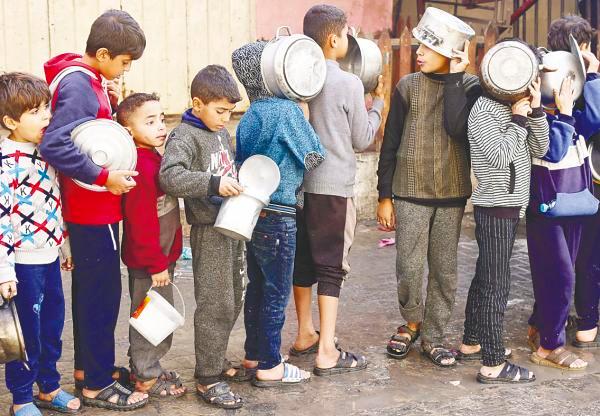“SAVE my parents, siblings and grandparents first. Then, save me. Save me last, I do not want to be the first.” These were the words of 13-year-old Palestinian girl, Alma, who was trapped under the rubble of a collapsed building during Israeli attacks.
Altruism, the principle of prioritising the welfare of others over oneself, which was embedded in this girl’s soul became an unshakable social fortress, making her impervious to the enemy’s bullets and missile blasts.
Drawing inspiration from this story, I implore readers to see altruism as a bedrock of our society amid the fabric of today’s socioeconomic landscape where power and influence are dominated by political authorities and capitalist markets.
The agenda of empowering the people has ultimately turned into mere fodder for political campaigns during elections, governments’ promises at international forums or simply a chant for corporate social responsibility. This glaringly manifests in recent figures.
In 2022, the gross national income gap between high-income nations and developing and poor nations surged by US$1.9 trillion (RM8.73 trillion) compared with 2015 figures.
Nevertheless, official development assistance from these affluent nations falls short by US$200 billion of the agreed-upon target within the Sustainable Development Goals (SDGs).
During that same year, chief executive officers of S&P 500-listed giant corporations received an average income of US$16.7 million, which was 272 times the median salary of their employees.
More concerning is that only US$1.3 trillion was spent annually (with over 70% in the form of loans) compared with the required US$4 trillion each year before 2030 to curb global warming below the 1.5°C threshold.
In my view, altruism, which is often undervalued, serves not only as a direct remedy for suffering through post-disaster aid and relief but also wields influence over the formulation of more inclusive government policies as well as corporate decisions that prioritise people’s well-being and environmental sustainability.
Nevertheless, unlocking the true potential of altruism can prove challenging as long as our understanding of this dynamic concept of social contract remains tethered to an antiquated mindset.
Here are three shifts essential for shaping a new way of thinking about the role of altruism in a world grappling with a poly-crisis – a scenario marked by complex and interconnected challenges such as economic sluggishness, geopolitical turmoil and climate change happening concurrently.
Firstly, doing good to others should be seen as a moral duty, rather than a voluntary act of charity.
Professor and philosopher at Princeton University Peter Singer asserts that when giving to those in need is “regarded as an act of charity, it is not thought that there is anything wrong with not giving”.
As such, the charitable man will always be praised but the one amassing wealth for himself is rarely condemned.
Islam, on the other hand, elevates altruism or ihsan to a higher level by linking it to faith, as the saying of Prophet Muhammad goes: “None of you (truly) believes until he loves for his brother that which he loves for himself” (Al-Bukhari and Muslim).
Secondly, this sense of moral duty must extend beyond personal pursuit and infiltrate the formulation of corporate objectives and strategies.
We need to break free from the orthodox belief that prioritising social values over profit will inevitably lead to losses for businesses.
This change can be spearheaded by Islamic financial institutions, especially in response to Prime Minister Datuk Seri Anwar Ibrahim’s call in his Budget 2024 speech to revitalise the industry’s role in shaping a just and more compassionate economic system.
Under Bank Negara Malaysia’s Value-Based Intermediation frame-work, Islamic banks and takaful operators are encouraged to actively engage with stakeholders in the spirit of syura for societal needs such as education, healthcare and social security by designing innovative financing and protection solutions that harmonise profit and social impact.
In addition, blending Islamic philanthropic mechanisms, such as zakat, waqf and sadaqah, with financial instruments including micro-financing, as seen in initiatives such as iTEKAD, orchestrated through partnerships among Islamic banks, state religious councils, non-governmental organisations and foundations, showcases an unequivocal commitment to altruism.
Such approaches can promote trust and reputation within communities, bolster the brand image and secure unwavering customer loyalty.
Thirdly, what is more important is the impact or quality of the assistance rendered rather than the quantity itself.
Every company needs to develop a social impact measurement method that evaluates the efficacy of their various welfare programmes in bringing about long-term positive changes in the lives of individuals and communities in a more objective and evidence-based manner.
This practice is important to ensure companies allocate their limited resources accountably, aiming to maximise social benefits for recipients, rather than using it as a marketing gimmick (virtue-washing).
May this fresh outlook sculpt an altruistic and cohesive society that thrives on the principles of ethics, empathy and compassion, especially in times of turbulence.
The writer is a lecturer at the Institute of Islamic Banking and Finance at International Islamic University Malaysia and a consultant at Masryef Advisory. Comments: letters@thesundaily.com









